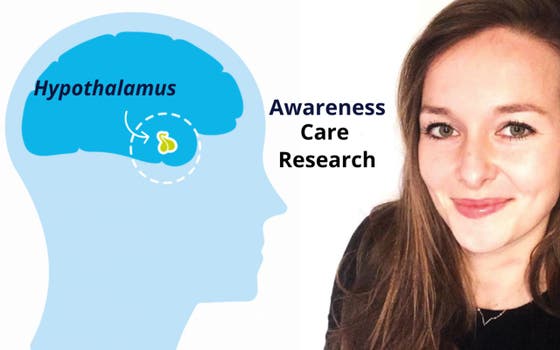Utrecht collaboration strengthens care and research

Children with a tumour near the hypothalamus - the hormone centre in the brain - may suffer from hormone imbalances. This can be caused by the tumour, but symptoms can also worsen after treatment through surgery or radiotherapy. If the hypothalamus is damaged, in addition to a hormone imbalance, there is also a disturbed sense of hunger and thirst, heat regulation and day-night rhythms. As a result, they may suffer from severe obesity and chronic fatigue after treatment.
Lees artikel in het Nederlands >
The WKZ/UMC Utrecht in collaboration with the Prinses Máxima Centre is a recognised centre of expertise for rare hypothalamic diseases. Physician-researcher Jiska van Schaik studied the effect of treatment in children with hypothalamic dysfunction (HD) in Utrecht. She saw that healthcare providers from the WKZ and the Prinses Máxima Centre started to cooperate smartly and multidisciplinary to improve care and increase scientific knowledge. Jiska, who received her PhD this week, found that this approach was successful. "We treat patients dealing with the consequences of HD. We see that extreme obesity can be prevented in a third of these children by providing them with better guidance."
Every year, 10 children are diagnosed with craniopharyngeoma, and another 10-15 with a tumour of another nature in the suprasellar region. So it is a rare condition that can mostly be treated, but with great impact on the quality of life of these children. Jiska: "It's a complicated problem for the surgeon and the paediatric endocrinologist, because removing too much of the tumour causes damage to hypothalamus and pituitary gland, but removing too little increases the risk of tumour growth or tumour recurrence. And radiotherapy (radiation) does not always offer a solution and in turn has adverse late effects."
Asked whether Jiska thinks the damage can be mitigated, she indicates that awareness among paediatricians, adolescent doctors and general practitioners is essential. What else helps these patients? "Early treatment of severe weight gain is important. We see that starting multidisciplinary care right away after surgery, for example counselling by physiotherapist, dietician and psychologist and medical social work is effective. Here, good explanation of the cause of the urge to eat and excess weight to the parents, child and environment is essential.
Future
"On the one hand, research is being conducted into other types of therapies for treating these brain tumours, so that surgery can be avoided and there is a greater chance that the hypothalamus can remain intact. And follow-up research is being done on risk factors and treatment of HD," Jiska says. "Led by association professor Hanneke van Santen, the team is working to raise awareness among paediatric oncologists, paediatric endocrinologists and paediatricians. Together with others, the doctors and researchers are working to develop the Endowatch that can help these patients and their parents. A new trial of a promising drug against hypothalamic obesity will also start soon. There is a large international network which is necessary for such rare disorders to develop more knowledge and better treatments for patients."
